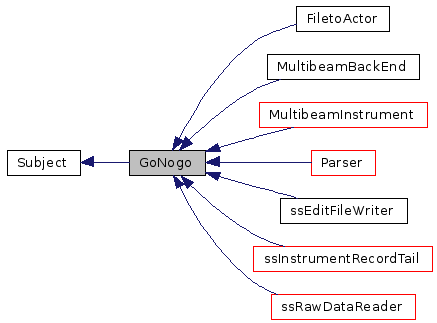
#include <GoNogo.h>
Inheritance diagram for GoNogo:


Public Member Functions | |
| GoNogo (bool ok=true, bool go=true) | |
| Default ctor. | |
| virtual | ~GoNogo () |
| Dtor. | |
| virtual bool | ok () const |
| Determine the state of OK. | |
| virtual bool | go () const |
| Determine the state of GO. | |
| virtual void | reset () |
| Reset to both GO and OK. | |
| virtual void | resetGoNogo () |
| Reset to GO. | |
| virtual void | resetOk () |
| If the object is GO then reset to OK. | |
Protected Member Functions | |
| void | notOk () |
| Make object not OK. | |
| void | noGo () |
| Make object NOGO. | |
This class will allow deriving classes to maintain their "GO" and "OK" states.
Definition at line 19 of file GoNogo.h.
| GoNogo::GoNogo | ( | bool | ok = true, |
|
| bool | go = true | |||
| ) |
Default ctor.
Initializes to both GO and OK.
| ok | the value of OK. | |
| go | the value of GO. |
| virtual GoNogo::~GoNogo | ( | ) | [virtual] |
Dtor.
| virtual bool GoNogo::ok | ( | ) | const [virtual] |
Determine the state of OK.
| virtual bool GoNogo::go | ( | ) | const [virtual] |
Determine the state of GO.
| virtual void GoNogo::reset | ( | ) | [virtual] |
Reset to both GO and OK.
| virtual void GoNogo::resetGoNogo | ( | ) | [virtual] |
Reset to GO.
This will force the object to become OK.
| virtual void GoNogo::resetOk | ( | ) | [virtual] |
If the object is GO then reset to OK.
| void GoNogo::notOk | ( | ) | [protected] |
Make object not OK.
| void GoNogo::noGo | ( | ) | [protected] |
Make object NOGO.